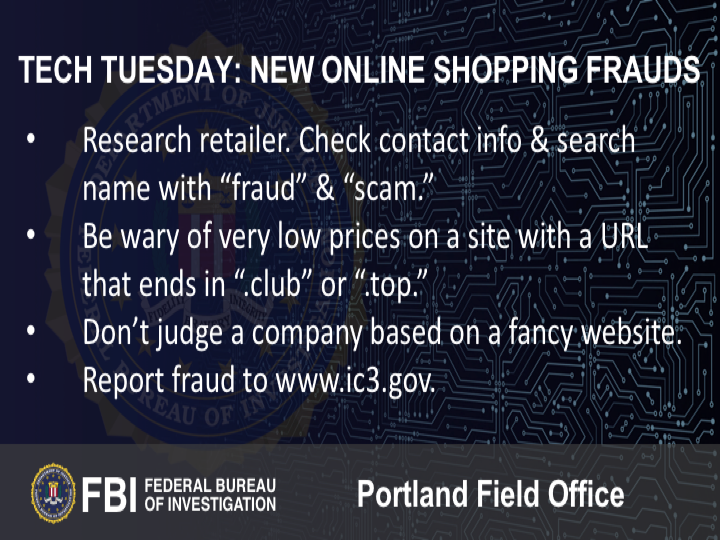Oregon FBI’s Tech Tuesday: Defending against new online shopping frauds

PORTLAND, Ore. (KTVZ) -- This week, the Oregon FBI’s Tech Tuesday segment focuses on building a digital defense against new online shopping frauds.
The FBI is seeing an increasing number of victims who are not receiving items they purchased online. Typically, the buyer is finding items such as gym equipment, small appliances, tools and furniture listed at prices lower than what is available elsewhere. Victims reported they were led to these websites via ads on social media or while searching for specific items through online search engines.
Common factors that tend to tie these victims together:
- The shipment included face masks shipped from China, regardless of what was ordered.
- Victims made payment using an online money transfer service.
- The retail websites provided valid U.S. addresses and telephone numbers under a “Contact Us” link, but the contact info was misleading. The victims thought the retailer was located within the U.S. when it was not.
- Many of the websites used content copied from legitimate sites; in addition, the same unassociated addresses and telephone numbers were listed for multiple retailers.
Some victims who complained to the vendor about their shipments were offered partial refunds and told to keep the face masks as compensation. Others were told to return the items to China – at their own expense – in order to be reimbursed. All attempts made by the victims to be fully reimbursed, or to receive the actual items ordered, were unsuccessful.
Here are some warning signs for shoppers to watch for:
- Instead of a website ending in .com, the fraudulent websites used the domains “.club” and “.top.”
- Websites offered merchandise at significantly discounted prices.
- Uniform Resource Locator (URL) or web addresses were registered recently (within the last six months).
- Websites used content copied from legitimate sites and often shared the same contact information.
Here are some ways to stay safe:
- Do your homework on the retailer to ensure it is legitimate. Search for reviews and include the words “scam” or “fraud”.
- Check the vendor on the Better Business Bureau’s website (www.bbb.org).
- Confirm the contact details of the vendor’s website prior to purchase – specifically the address, email, and phone number.
- Be wary of online retailers who use a free email service instead of a company email address.
- Don’t judge a company by its website; flashy websites can be set up and taken down quickly.
If you become a target of this scam, make sure to notify your bank immediately and ask to have the transaction stopped or reversed. As always, if you have been victimized by a cyber fraud, you can report it to the FBI’s Internet Crime Complaint Center at www.IC3.gov or call your local FBI office.